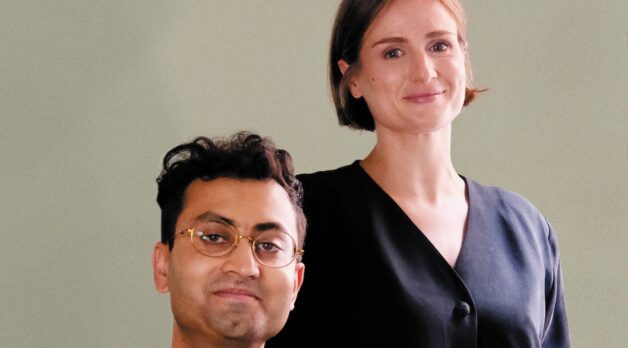Bryn Silverman and Naveen Chaubal
 Bryn Silverman and Naveen Chaubal
Bryn Silverman and Naveen Chaubal

Naveen Chaubal and Bryn Silverman began collaborating as undergraduates at the University of Southern California, where they both studied film production. Hailing from small towns in Indiana and Oregon, respectively, they first connected within an “amazing friend group” that made work together. “I love the journey that we’ve been on,” Silverman says about their roughly 17-year connection. She’s long admired Chaubal’s “commitment to craft”; he cites her knack for “experimentation” as an enduring source of inspiration.
Chaubal received his degree in 2010, a semester earlier than class of ’11 Silverman. Their first post-grad project was shooting yoga videos in Guatemala. “I was bartering for rent,” jokes Silverman. “It seemed like everyone else was getting ‘normal’ jobs in the industry,” Chaubal recalls of his other classmates. “For better or worse, we weren’t.” Silverman continued on an international path, securing “kind of random” commercial gigs in Germany and Jordan, bringing Chaubal on whenever possible between commissioned projects in Los Angeles, New York and India.
Largely working as a “two-person band” during this time—switching off on directing, producing, cinematography and editing credits—the pair knew that they had the ability to “be the creative leads ourselves.” Especially after tackling feature film production (notably, Chaubal co-shot and co-produced the 2014 Indiana-set doc Tomorrow We Disappear, on which another filmmaker on this list, Caitlyn Greene, served as assistant editor), they realized that their niche would entail telling stories from their own communities “rather than trying to find a story ripped from a headline.”
The perfect opportunity to helm their own film arrived in 2017, when they came across an “incredibly cinematic” speedway in southern Indiana, just over the river from Louisville, Kentucky. Pinball, the resulting short, is a “sort of hybridized” story about an orphaned teen named Yosef who fantasizes about racing defunct school buses. Tinted in hazy hues of dusk and floodlights, the nine-minute film has since served as a jumping off point for the duo’s forthcoming feature of the same name, which focuses on Yosef’s quotidian experiences as an aspiring college soccer player. They started filming the feature version of Pinball in 2019 and are currently in post-production, expecting to have a rough cut this fall. “Editing is hard in groups,” Silverman notes of their dual approach to the cut. “It feels like a spaceship that one person has to drive for a while; then, you trade off.”
Close to where Chaubal grew up, Louisville has become their home base, and they describe the city’s creative community as “beautiful and welcoming.” Indeed, Silverman highlights her connection to producer Darcy McKinnon, who she describes as “the godmother of documentary film in the South,” though she has a general “thirst for mentorship.” They also founded Hyphen Film Center, a community screening initiative that’s been hosting events for the past three years. “It’s about valuing intimate screenings and the micro-cinema concept,” says Chaubal. “We’re changing the whole idea of ‘bigger is better.’”
For the past five years, they’ve also been working on a documentary about Annie Oakley. More precisely, they’ve been filming three elderly women who work in a research library dedicated to the sharpshooter in her hometown of Greenville, Ohio, only a three-hour drive from Louisville. “We went up there out of curiosity while working on the short,” Silverman notes of the project’s origins. “They talk about her like she’s a relative,” Chaubal notes of their subjects. “It feels like you’re around the kitchen counter and chatting with this historical figure.” Also in post-production, that project is still looking for an actor to read excerpts from Oakley’s autobiography for voiceover.
When it comes to imagining their future, the pair pose big questions about their own place in the industry, particularly as it pertains to forging their own path outside an established system. They are extremely interested in connecting with prospective producers with a demonstrative interest in telling stories in their region. “How can we be a part of this ecosystem and help distribute the films that we would want to see?” asks Silverman. “Maybe we don’t live in a world where we can make money on the backend anymore, but audiences are out there and you can reach them.”—Natalia Keogan/Image: Bryn Silverman and Naveen Chaubal
